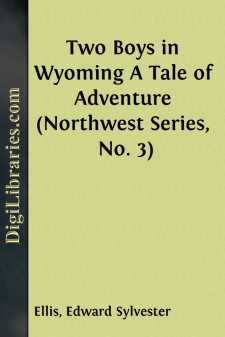Categories
- Antiques & Collectibles 13
- Architecture 36
- Art 48
- Bibles 22
- Biography & Autobiography 813
- Body, Mind & Spirit 142
- Business & Economics 28
- Children's Books 17
- Children's Fiction 14
- Computers 4
- Cooking 94
- Crafts & Hobbies 4
- Drama 346
- Education 46
- Family & Relationships 57
- Fiction 11829
- Games 19
- Gardening 17
- Health & Fitness 34
- History 1377
- House & Home 1
- Humor 147
- Juvenile Fiction 1873
- Juvenile Nonfiction 202
- Language Arts & Disciplines 88
- Law 16
- Literary Collections 686
- Literary Criticism 179
- Mathematics 13
- Medical 41
- Music 40
- Nature 179
- Non-Classifiable 1768
- Performing Arts 7
- Periodicals 1453
- Philosophy 64
- Photography 2
- Poetry 896
- Political Science 203
- Psychology 42
- Reference 154
- Religion 513
- Science 126
- Self-Help 84
- Social Science 81
- Sports & Recreation 34
- Study Aids 3
- Technology & Engineering 59
- Transportation 23
- Travel 463
- True Crime 29
Sort by:
Chapter I. A Strange Guide. “Well, if he doesn’t beat any one I ever heard of!” Mickey O’Rooney and Fred Munson were stretched on the Apache blanket, carefully watching the eyes of the wild beast whenever they showed themselves, and had been talking in guarded tones. The Irishman had been silent for several minutes, when the lad asked him a question and received no answer. When the thing was...
more...
INTRODUCTION I purpose telling you in the following pages about the exploits of the gallant men who composed the American Navy, beginning with the Revolution and ending with the story of their wonderful deeds in our late war with Spain. You can never read a more interesting story, nor one that will make you feel prouder of your birthright. While our patriot armies have done nobly, it is none the less...
more...
CHAPTER I. The mountain's sidesAre flecked with gleams of light and spots of shade;Here, golden sunshine spreads in mellow rays, and there,Stretching across its hoary breast, deep shadows lurk.A stream, with many a turn, now lost to sight,And then, again revealed, winds through the vale,Shimmering in the early morning sun.A few white clouds float in the blue expanse,Their forms...
more...
CHAPTER I. ALONE AND TOGETHER. The reader will recall that at the close of The River Fugitives the narrative left our friends in a situation, apparently, of safety; and the belief, on the part of Jo Minturn, his sister Rosa and Ned Clinton, was strong that, in their flight from the dreadful scenes of the Wyoming massacre of July, 1778, they had left all dangers behind. They were confident that, under...
more...
CHAPTER I. A WARNING In the valley of the Rio Pecos, years ago, an attempt at founding a settlement was made by a number of hardy and daring New Englanders, whose leader was a sort of Don Quixote, who traveled hundreds of miles, passing by the richest land, the most balmy climate, where all were protected by the strong arm of law, for the sake of locating where the soil was only moderate, the climate...
more...
CHAPTER I. Kit Carson's Youth—His Visit to New Mexico—Acts as Interpreter and inVarious Other Employments—Joins a Party of Trappers and Engages in aFight with Indians—Visits the Sacramento Valley. "Kit Carson," the most famous hunter, scout and guide ever known in this country, was a native of Kentucky, the scene of the principal exploits of Daniel Boone, Simon Kenton, the Wetzel...
more...
JACK AND FRED. You should have seen those youths, for it gives me pleasure to say that two manlier, more plucky and upright boys it would be hard to find anywhere in this broad land of ours. I have set out to tell you about their remarkable adventures in the grandest section of the West, and, before doing so, it is necessary for you to know something concerning the lads themselves. Jack Dudley was in...
more...
AT THE RANCH. Avon Burnet, at the age of eighteen, was one of the finest horsemen that ever scurried over the plains of Western Texas, on his matchless mustang Thunderbolt. He was a native of the Lone Star State, where, until he was thirteen years old, he attended the common school, held in a log cabin within three miles of his home, after which he went to live with his uncle, Captain Dohm Shirril,...
more...
THE RESCUE. If it were done, when 'tis done, then 'twere well It were done quickly.—Macbeth. "Quick, boys, and be careful that they don't see your heads." Four men were moving along under the bank of the Miami, with their bodies bent, at a gait that was almost rapid enough to be called a run. They were constantly raising their heads and peering over the bank, as though watching...
more...
CHAPTER ONE: OMAS, ALICE, AND LINNA I don't suppose there is any use in trying to find out when the game of "Jack Stones" was first played. No one can tell. It certainly is a good many hundred years old. All boys and girls know how to play it. There is the little rubber ball, which you toss in the air, catch up one of the odd iron prongs, without touching another, and while the ball is...
more...











